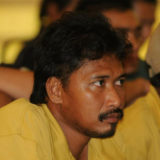
Samsir, DGFC’s most senior Research Assistant, grew up in a palm oil Estate and had never been in the forest before joining DG as a maintenance handyman, in 2010. His previous jobs were all related to the activities of the palm oil plantations, the latest being a lorry driver. He heard of a vacant at DGFC through a friend who was working there at that time. Samsir thought it was worth giving the job a try since the salary and working conditions were very convenient; no passports were being kept, working days were fixed, his wife and children could live with him, plus the accommodation and food were provided. He was not expecting the job to be the life changing opportunity it turned out to be.
Samsir still remembers being afraid and shy of all the “orang putih” (“white” people) coming and going at DGFC, because he couldn’t understand their language. He deliberately avoided looking at them in the eye, thinking they might even harm him. However, he found all these “orang-putih” very intriguing. Why were they looking at frogs, or ants? What was special about all that? In his opinion, all of them were crazy and wasting their time. He started observing the students and researchers, and getting interested in what they were doing. Soon he was promoted as Research Assistant, spotting and capturing frogs as his first assignment. He turned out to be very skilled at both activities and quickly learned that animals had scientific names; he eagerly memorized them all. He also learned that many of the animals he took for granted only lived in Sabah, and that was his first eye opener to conservation. He understood the treasure of the forest and the need to protect it and tell others about it.
Samsir is grateful for the opportunities DGFC has given to him, like becoming an Honorary Wildlife Warden (HWW) or being part of the Wildlife Health Unit (WHU). His awareness for conservation increased when he joined the Sabah Wildife Department’s training course to become a Warden. As a HWW, now he’s empowered to confiscate wildlife or its products and even arrest the people who possesses them. The importance of the research on wildlife and the ecosystem was something he appreciated in full through the training given by our collaborators by EcoHealth Alliance on “Surveillance and Prevention of Emerging Infectious Diseases from Wildlife”. After the training, he was chosen to be a part of the WHU for PREDICT’s Deep Forest Project. Today, Samsir can trap live bats and rodents, get blood samples from them, prepare those samples to keep viruses alive, and separate red blood cells and serum, all using the correct equipment to avoid being infected or infect others with any pathogen the animals might carry. When helping other projects at DGFC, he shares his knowledge on what he sees and finds in the forest with new and senior students alike. Whenever he feels the job is too much or too difficult, he finds inspiration in the dedication to conservation and research shown by DGFC’s director and rest of the staff, as well as from his mates from the WHU.
Samsir feels lucky as he realises not everyone has got the chances he had, and he is eager to keep on learning. He understands that his work is key, among other things, in the identification of new diseases for people and wildlife. Whenever he goes back to the Estate he grew up in, his friends tell him he is now doing the work of an “orang-putih”. Because of his background, plantation workers open up to him and listen to what he has to say. In his own way, Samsir has also become an inspiration and teacher, and hopes, this way, to save the forest for his children and for everyone else.
